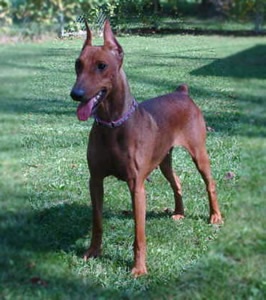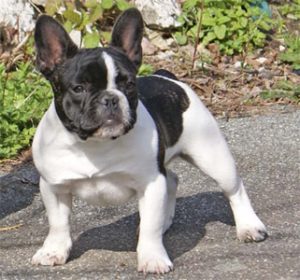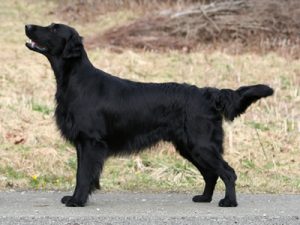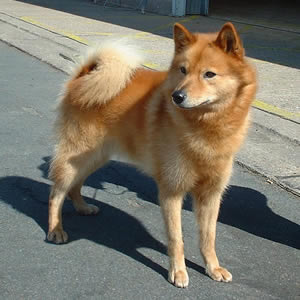
The German Shepherd Dog (GSD, also known as an Alsatian), (German: Deutscher Schäferhund) is a breed of large-sized dog that originated in Germany. German Shepherds are a relatively new breed of dog, whose origins date to 1899. As part of the Herding group, the German Shepherd is a working dog developed originally for herding sheep. Because of their strength, intelligence and abilities in obedience training they are often employed in police and military roles, in forces around the world. Due to their loyal and protective nature, the German Shepherd is one of the most registered of breeds.
Description
German Shepherds are a large-breed dog which generally are between 55 and 65 centimetres (22 and 26 in) at the withers and weigh between 22 and 40 kilograms (49 and 88 lb). The ideal height is 63 centimetres (25 in), according to Kennel Club standards. They have a domed forehead, a long square-cut muzzle and a black nose. The jaws are strong, with a scissor-like bite. The eyes are medium-sized and brown with a lively, intelligent, and self-assured look. The ears are large and stand erect, open at the front and parallel, but they often are pulled back during movement. They have a long neck, which is raised when excited and lowered when moving at a fast pace. The tail is bushy and reaches to the hock.
German Shepherds can be a variety of colours, the most common of which are the tan/black and red/black varieties. Both varieties have black masks and black body markings which can range from a classic “saddle” to an over-all “blanket.” Rarer colour variations include the sable, all-black, all-white, liver, and blue varieties. The all-black and sable varieties are acceptable according to most standards; however, the blue and liver are considered to be serious faults and the all-white is grounds for instant disqualification in some standards. This is because the white coat is more visible, making the dog a poor guard dog, and harder to see in conditions such as snow or when herding sheep.
German Shepherds sport a double coat. The outer coat, which is shed all year round, is close and dense with a thick undercoat. The coat is accepted in two variants; medium and long. The long-hair gene is recessive, making the long-hair variety rarer. Treatment of the long-hair variation differs across standards; they are accepted under the German and UK Kennel Clubs but are considered a fault in the American Kennel Club.
Aggression and biting
German Shepherd Dogs have a reputation among some individuals for biting and have been banned in some jurisdictions as a result. However, German Shepherd Dogs are among the top five most popular dogs in the United States according to American Kennel Club statistics and well-trained and socialised German Shepherd Dogs have a reputation among many as being very safe (see Temperament section below). In the United States, one source suggests that German Shepherd Dogs are responsible for more reported bitings than any other breed, and suggest a tendency to attack smaller breeds of dogs. An Australian report from 1999 provides statistics showing that German Shepherd Dogs are the breed third most likely to attack a person in some Australian locales.
However, the Centres for Disease Control and Prevention, which advises on dog bite prevention and related matters, states “There is currently no accurate way to identify the number of dogs of a particular breed, and consequently no measure to determine which breeds are more likely to bite or kill.” Similarly, the American Veterinary Medical Association through its Task Force on Canine Aggression and Canine-Human Interactions reports, “There are several reasons why it is not possible to calculate a bite rate for a breed or to compare rates between breeds. First, the breed of the biting dog may not be accurately recorded, and mixed-breed dogs are commonly described as if they were purebreds. Second, the actual number of bites that occur in a community is not known, especially if they did not result in serious injury. Third, the number of dogs of a particular breed or combination of breeds in a community is not known, because it is rare for all dogs in a community to be licensed, and existing licensing data is then incomplete.” Moreover, studies rely on ‘reported’ bites, leading the National Geographic Channel television show, The Dog Whisperer to conclude that small dog breeds are likely responsible for more bites than large dog breeds, but often go unreported. In addition, according to the National Geographic Channel television show, Dangerous Encounters, the bite of a German Shepherd Dog has a force of over 200 pounds (compared with that of a Rottweiler, over 300 pounds of force, a Pitbull, also over 200 pounds of force, a Labrador Retriever, of approximately 125 pounds of force, or a human, of approximately 170 pounds of force), which means it is important to note the impact that ‘reported’ bites and serious injury have on any dog bite studies and to distinguish a dog attack from ‘aggression’. Regardless, one source indicates that fatalities have been attributed to over 30 breeds since 1975, including small breeds, such as the Pomeranian.
These claims have also been disputed on the statistical basis that German Shepherds represent a higher proportion of the population than other breeds and also because of the use of German Shepherd Dogs as protection dogs, which would require controlling statistical data for “pet” or “companion” use and not military, police or guard use. It is also important to note that German Shepherds are very common in cross-bred canines. And due to their popularity the layman will likely recognise most GSD cross-breeds simply as “German Shepherd,” if a report is ever filed.
Temperament
German Shepherds are highly active dogs, and described in breed standards as self-assured. The breed is marked by a willingness to learn and an eagerness to have a purpose. Shepherds have a loyal nature and bond well with people they know. However, they can become over-protective of their family and territory, especially if not socialised correctly. An aloof personality makes them approachable, but not inclined to become immediate friends with strangers. German Shepherds are highly intelligent and obedient and some people think they require a “firm hand”, but more recent research into training methods has shown they respond as well, if not better, to reward based training methods.
—————————————————————————————————————–
CARING FOR YOUR DOG NEWSLETTER – Delivered Directly To Your Inbox – Starting Immediately – SIGN UP FOR FREE TODAY
—————————————————————————————————————–




